2022中考英语一轮复习PPT课件 第14课时 Units 1—2,Book 9
文档属性
| 名称 | 2022中考英语一轮复习PPT课件 第14课时 Units 1—2,Book 9 | 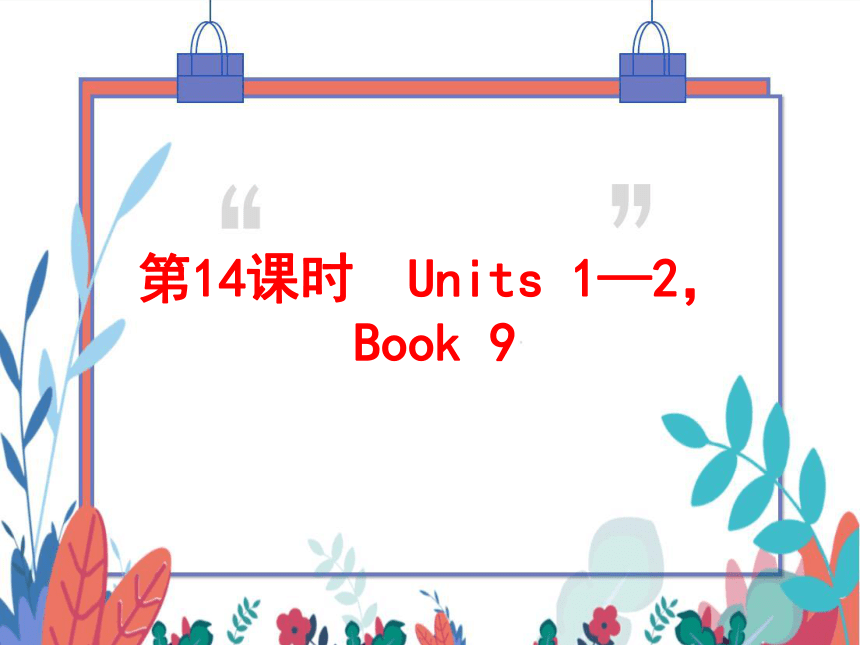 | |
| 格式 | ppt | ||
| 文件大小 | 676.0KB | ||
| 资源类型 | 试卷 | ||
| 版本资源 | 通用版 | ||
| 科目 | 英语 | ||
| 更新时间 | 2022-06-01 15:06:18 | ||
图片预览

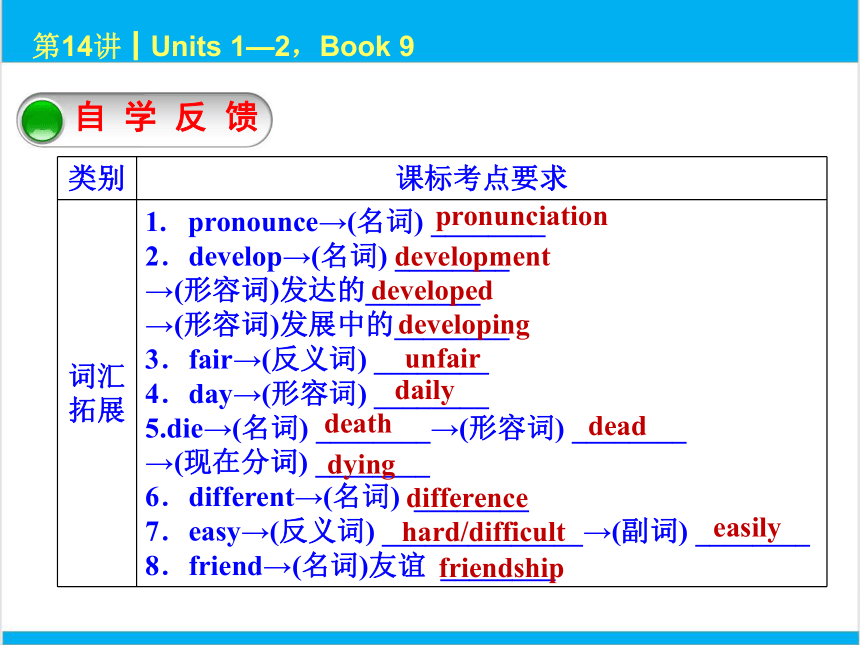
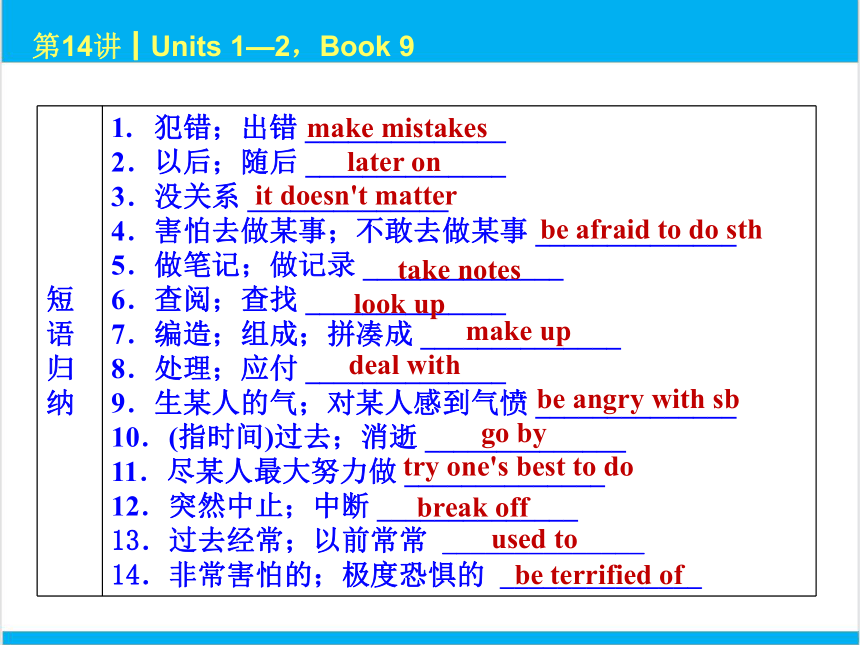
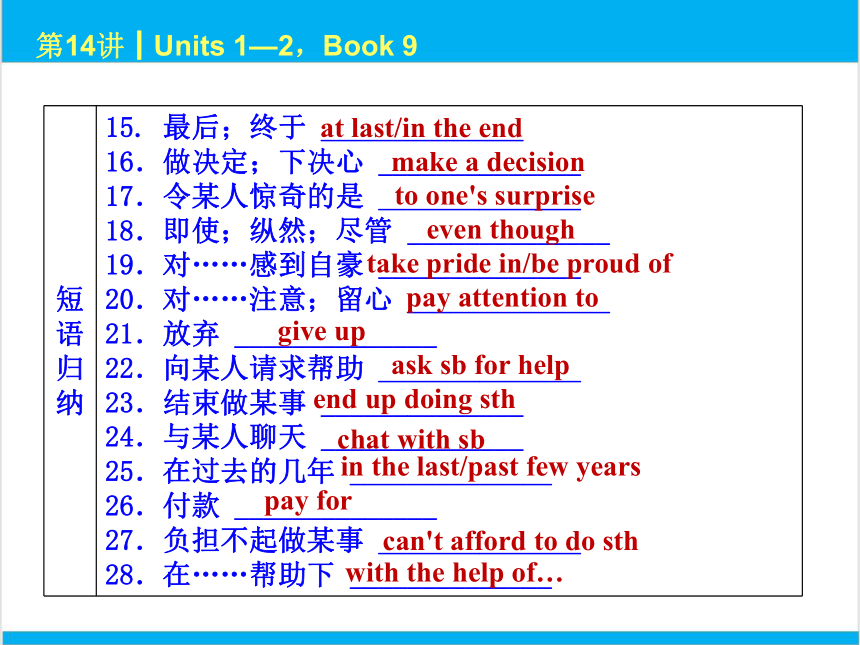
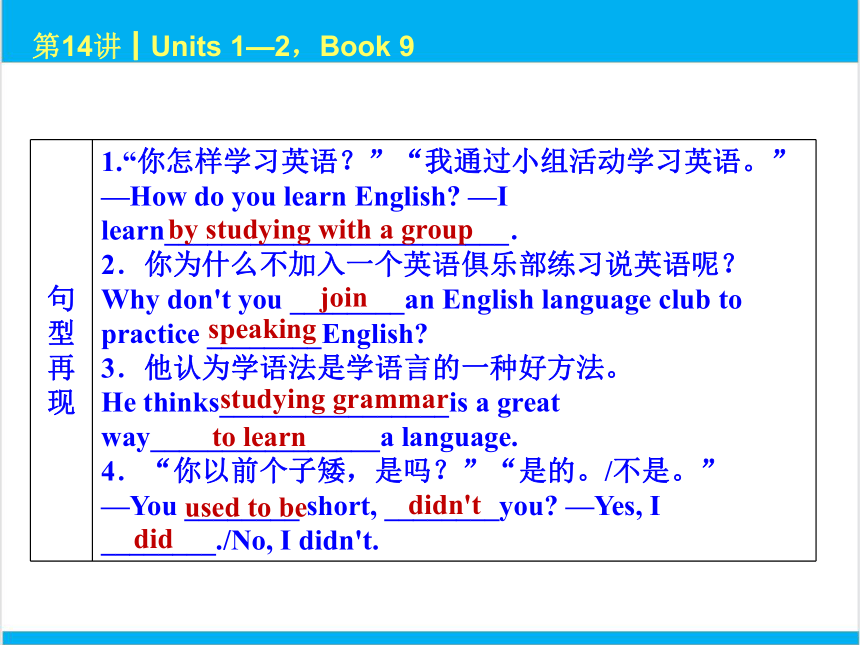
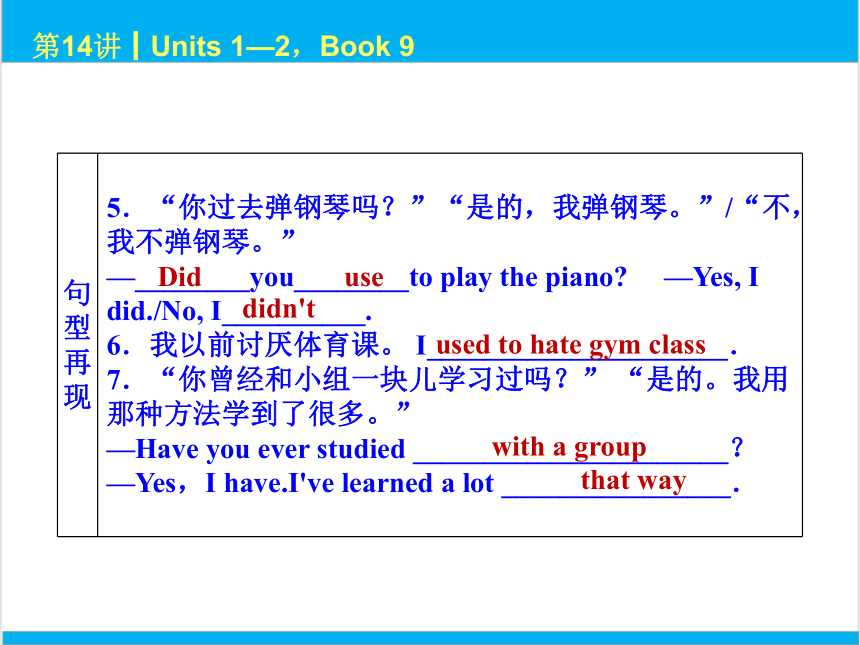
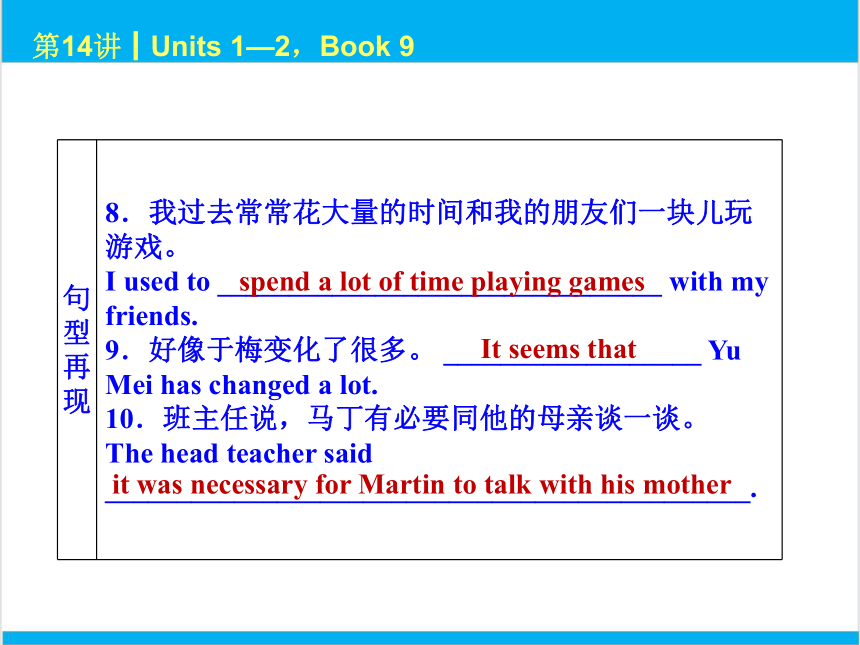
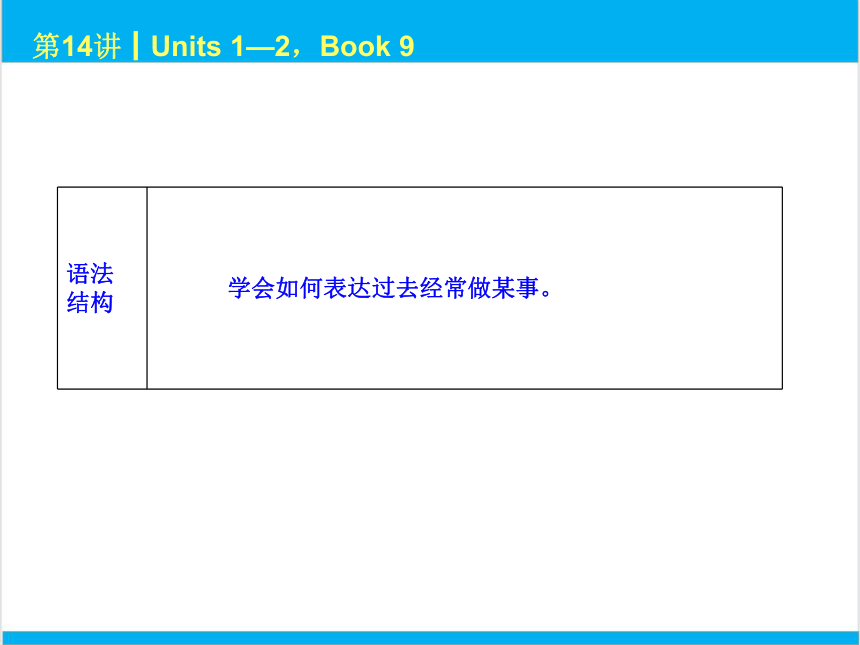
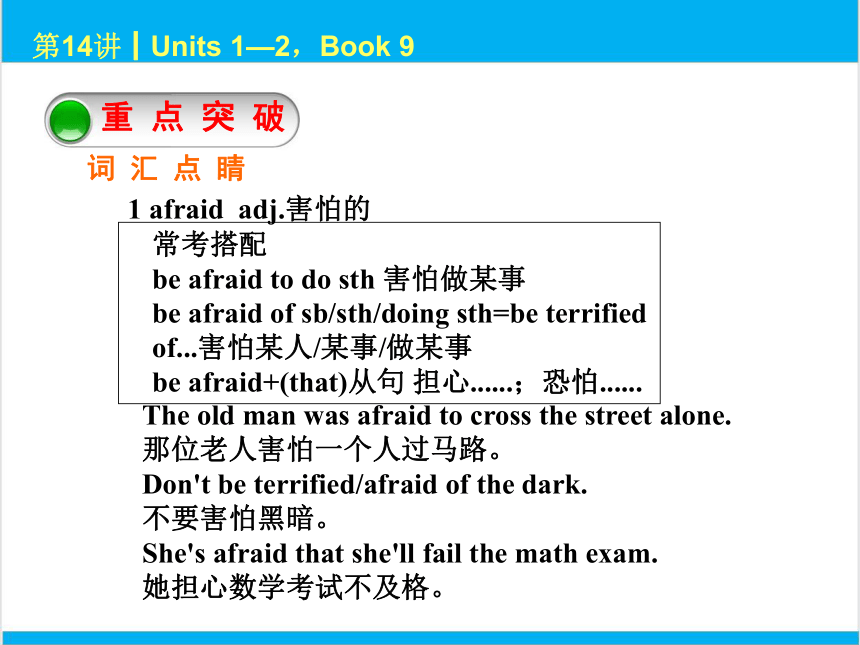
文档简介
(共28张PPT)
第14课时 Units 1—2,Book 9
第14讲┃Units 1—2,Book 9
自 学 反 馈
类别 课标考点要求
词汇
拓展 1. pronounce→(名词) ________
2.develop→(名词) ________
→(形容词)发达的________
→(形容词)发展中的________
3.fair→(反义词) ________
4.day→(形容词) ________ 5.die→(名词) ________→(形容词) ________
→(现在分词) ________
6.different→(名词) ________
7.easy→(反义词) ______________→(副词) ________
8.friend→(名词)友谊 ________
pronunciation
developed
developing
unfair
development
daily
death
dead
dying
difference
hard/difficult
easily
friendship
第14讲┃Units 1—2,Book 9
短语
归纳 1. 犯错;出错 ______________
2.以后;随后 ______________
3.没关系 ______________
4.害怕去做某事;不敢去做某事 ______________
5.做笔记;做记录 ______________
6.查阅;查找 ______________
7.编造;组成;拼凑成 ______________
8.处理;应付 ______________
9.生某人的气;对某人感到气愤 ______________
10.(指时间)过去;消逝 ______________
11.尽某人最大努力做 ______________
12.突然中止;中断 ______________
13.过去经常;以前常常 ______________
14.非常害怕的;极度恐惧的 ______________
make mistakes
later on
it doesn't matter
be afraid to do sth
take notes
look up
make up
deal with
be angry with sb
go by
try one's best to do
break off
used to
be terrified of
短语
归纳 15. 最后;终于 ______________
16.做决定;下决心 ______________
17.令某人惊奇的是 ______________
18.即使;纵然;尽管 ______________
19.对……感到自豪 ______________
20.对……注意;留心 ______________
21.放弃 ______________
22.向某人请求帮助 ______________
23.结束做某事 ______________
24.与某人聊天 ______________
25.在过去的几年 ______________
26.付款 ______________
27.负担不起做某事 ______________
28.在……帮助下 ______________
at last/in the end
make a decision
to one's surprise
even though
take pride in/be proud of
pay attention to
give up
ask sb for help
第14讲┃Units 1—2,Book 9
end up doing sth
chat with sb
in the last/past few years
pay for
can't afford to do sth
with the help of…
第14讲┃Units 1—2,Book 9
句型
再现 1.“你怎样学习英语?”“我通过小组活动学习英语。”
—How do you learn English —I learn________________________.
2.你为什么不加入一个英语俱乐部练习说英语呢?
Why don't you ________an English language club to practice ________English
3.他认为学语法是学语言的一种好方法。
He thinks________________is a great way________________a language.
4.“你以前个子矮,是吗?”“是的。/不是。”
—You ________ short, ________you —Yes, I ________./No, I didn't.
by studying with a group
join
speaking
studying grammar
to learn
used to be
didn't
did
第14讲┃Units 1—2,Book 9
句型
再现 5.“你过去弹钢琴吗?”“是的,我弹钢琴。”/“不,我不弹钢琴。”
—________you________to play the piano —Yes, I did./No, I__________.
6.我以前讨厌体育课。 I_____________________.
7.“你曾经和小组一块儿学习过吗?” “是的。我用那种方法学到了很多。”
—Have you ever studied ______________________?
—Yes,I have.I've learned a lot ________________.
Did
use
didn't
used to hate gym class
with a group
that way
第14讲┃Units 1—2,Book 9
句型
再现 8.我过去常常花大量的时间和我的朋友们一块儿玩游戏。
I used to _______________________________ with my friends.
9.好像于梅变化了很多。 __________________ Yu Mei has changed a lot.
10.班主任说,马丁有必要同他的母亲谈一谈。
The head teacher said _____________________________________________.
spend a lot of time playing games
It seems that
it was necessary for Martin to talk with his mother
第14讲┃Units 1—2,Book 9
语法
结构 学会如何表达过去经常做某事。
第14讲┃Units 1—2,Book 9
词 汇 点 睛
1 afraid adj.害怕的
The old man was afraid to cross the street alone.
那位老人害怕一个人过马路。
Don't be terrified/afraid of the dark.
不要害怕黑暗。
She's afraid that she'll fail the math exam.
她担心数学考试不及格。
重 点 突 破
常考搭配
be afraid to do sth 害怕做某事
be afraid of sb/sth/doing sth=be terrified
of...害怕某人/某事/做某事
be afraid+(that)从句 担心......;恐怕......
第14讲┃Units 1—2,Book 9
2 unless conj. 如果不;除非
[点拨] (1)unless引导条件状语从句,常与if…not互换。但在表示与某个客观事实相反的虚拟语气中,只能用if… not,不能用unless。
(2)unless引导的条件状语从句和if引导的时间状语从句一样,若主句为一般将来时,从句用一般现在时代替将来时。
She would have died if the doctors had not saved her. 如果医生不救她的话,她就死了。(不能用unless)
第14讲┃Units 1—2,Book 9
中考典例
I won't take part in Julie's birthday party______I am
invited. [2021·济宁]
A unless B after
C because D if
A
根据句意“除非我被邀请,否则我不会参加朱莉的生日晚会”可知选A。
解析
第14讲┃Units 1—2,Book 9
3 patient adj.忍耐的,有耐心的 n.患者,病人
[点拨] be patient with sb/sth 对某人/某事有耐心
Be patient with her. She is only a child.
对她要有耐心,她只是一个孩子。
4 pride n.得意;自豪
[点拨] take pride in = be proud of对……感到自豪/骄傲
They were proud of their success.
=They took pride in their success.
他们对他们的成功感到骄傲。
第14讲┃Units 1—2,Book 9
5 give up放弃
[点拨] give up后接名词、代词或动名词作宾语。若宾语为代词时,要用宾格且放在两词中间。
He gave up smoking last year.=He stopped smoking last year. 去年他戒了烟。
[拓展] 后接动名词的动词短语:
look forward to doing sth期待做某事
be used to doing sth习惯于做某事
feel like doing sth想做某事
cannot help doing sth忍不住做某事
put off doing sth推迟做某事
第14讲┃Units 1—2,Book 9
中考典例
-Smoking is bad for your health.
-You're right.I decide to______.
[2021·安徽]
A take it down B find it out
C turn it off D give it up
D
根据句意可知说话者决定戒烟,故选D。
解析
第14讲┃Units 1—2,Book 9
巧 辩 异 同
1 not…at all/Not at all.
(1)not…at all意为“根本不……”,用在句子中,not和be动词或助动词构成否定句。
She doesn't like meat at all. 她根本不喜欢肉。
I don't know it at all. 我根本不知道那件事。
(2)“Not at all.”常用在口语中,主要用于下列场合:
①当别人向你表示感谢时,“Not at all.”相当于“You're welcome.” “It's a pleasure.” “That's all right.”等。
—Thank you very much. 多谢。
—Not at all. 不用谢。
第14讲┃Units 1—2,Book 9
②当别人问你对某事介意不介意时,“Not at all.”相当于“Of course not.” “Certainly not.” “No, please.”等。
—Do you mind if I smoke here
我在这儿抽烟你介意吗?
—Not at all. 不介意。
③当别人因打扰你而向你致歉时,“Not at all.”相当于“It doesn't matter.” “That's all right.”等。
—I'm sorry to trouble you. 对不起,打扰你了。
—Not at all. 没关系。
第14讲┃Units 1—2,Book 9
2 go to sleep/be asleep/fall asleep/get to sleep/go to bed
(1)go to sleep指“入睡、进入梦乡”这个动作,即begin to sleep。
He was so tired that he went to sleep soon.
他很累,不久就睡着了。
(2)be asleep表示“睡着”的状态,是系表结构,其中asleep不能用very修饰,只能用sound, fast等词修饰。
The baby is sound asleep.孩子睡得很沉。
(3)fall asleep意为“睡着”,表示一个动作的过程,侧重于“自然而然地入睡”的含义。
I don't know when I fell asleep last night.
我不知道昨晚是什么时候睡着的。
第14讲┃Units 1—2,Book 9
(4)get to sleep意为“睡着、入眠”,强调进入睡眠状态,且多用于否定句、疑问句或条件句中。
I was waiting for the sound of the other shoe! I couldn't get to sleep.
我在等另一只鞋的声音!我睡不着。
(5)go to bed意为“就寝、上床睡觉”,着重指上床准备睡觉的动作,无“睡着”之意。一般说来,是go to bed在前,然后才go/get to sleep或fall asleep。
One may keep healthy if he goes to bed early and gets up early.
如果一个人早睡早起,他才可能保持身体健康。
第14讲┃Units 1—2,Book 9
句 型 透 视
1 I study by working with a group.
我通过小组活动来学习。
[句型] “by+动词?ing”结构在句子中作方式状语,常用来表示“以、靠、借助、通过、用(某种方法或手段)”。该结构常用来回答“How do you…?”或“How can I…?”之类的问题。
I want to improve my spoken English by talking with Englishmen.
我想通过与英国人交谈来提高我的英语口语。
第14讲┃Units 1—2,Book 9
[拓展] (1)当by和表示交通工具的名词(如bus, train, car, subway, bike, plane等)连用时,它与名词之间不用任何限定词,且名词用单数形式。
They often go to school by subway.
他们经常坐地铁上学。
(2)by, in 和with都可以表示“通过;借助”。by后接表示动作、行为的名词;in表示“用某种语言,用某种材料”;with 后接表示物体或工具的名词。
You can send the book by post.
你可以通过邮局把书寄出去。
You can write it in English.你可以用英语写。
He wrote the letter with a pen.
他用钢笔写了这封信。
第14讲┃Units 1—2,Book 9
中考典例
You can improve your English______reading
more.[2020·鞍山]
A in B with
Cby D of
C
by指通过某种方法或手段。
解析
第14讲┃Units 1—2,Book 9
2 Sometimes, however, he finds watching movies frustrating because the people speak too quickly. 然而,有时他发现看电影令人感到沮丧,因为(影片中的)人说话太快了。
[句型] “find+宾语+宾语补足语”意为“发现某人/某物……”,作宾语补足语的可以是现在分词、副词、名词、介词短语、(to be+)形容词等。
We found a group of children playing on the playground. 我们发现一群孩子正在操场上玩耍。(现在分词)
第14讲┃Units 1—2,Book 9
I found him out last night.
昨晚我发现他出去了。(副词)
You'll find it a good book.
你会发现它是本好书。(名词)
I found him already in the office.
我发现他已在办公室了。(介词短语)
I found him (to be) much younger than I had expected. 我发现他比我原先预料的年轻得多。[(to be+)形容词]
提醒:当find后接形容词作宾语补足语时,可改为“find+that从句”或“find +it+形容词+动词不定式”。
I find playing computer games frustrating.
=I find that playing computer games is frustrating.
=I find it frustrating to play computer games.
我发现玩电脑游戏令人感到沮丧。
第14讲┃Units 1—2,Book 9
3 I used to be afraid of the dark.我过去怕黑。
[句型] used to do sth 表示“过去常常做某事”,指过去常常发生的动作或存在的状态,而现在不再做了。
He used to become angry. 他过去常常生气。
(1)其否定句为didn't use to do或used not to do,used not可缩写为usedn't。
Mr Li didn't use to drink beer.
=Mr Li usedn't to drink beer.
李先生过去不常喝啤酒。
(2)used to 的疑问句形式是“Did…use to do?”或“Used…to do?”
Did she use to get up early
=Used she to get up early 她过去经常早起吗?
第14讲┃Units 1—2,Book 9
(3)used to 的反意疑问句也由助动词did(n't)或used(n't)构成。
Mario used to be late for school, didn't/usedn't he 马里奥以前上学经常迟到,不是吗?
[拓展] (1)be used to doing sth 表示“习惯于做某事”,to是介词,后跟名词、代词或动名词作宾语。
Amy is used to getting up early.艾米习惯早起。
(2)be used to do sth =be used for doing sth 表示“被用来做某事”。
Knives are used to cut things.
=Knives are used for cutting things.
刀是用来切东西的。
第14讲┃Units 1—2,Book 9
中考典例
Young people today______posting wonderful articles and
beautiful photos onto the micromessage(微信)to share
with friends.[2020·山西]
A are afraid of B are used to
C are worried about
B
第14讲┃Units 1—2,Book 9
4 I go to sleep with my bedroom light on. 我睡觉时卧室的灯开着。
[句型] 句中的with my bedroom light on是“with+宾语+宾语补足语”结构,on 是副词,在此表示“开着”。此结构常作状语,其中的宾语常常是名词,宾语补足语可以是介词短语、形容词、副词、过去分词等。
With some books in his hand, he entered the class room.他走进了教室,手里拿着一些书。(介词短语)
Don't sleep with the window open in winter.
冬天不要开着窗户睡觉。
第14讲┃Units 1—2,Book 9
With John away, we got more room. 约翰走开了,我们有了更多的空间。(副词)
The murderer was brought in, with his hands tied behind his back.凶手被带进来了,他的双手被绑在背后。(过去分词)
中考典例
海伦经常晚上开着灯就睡着了,因为她怕黑。
Helen often______ ______ ______with the bedroom
light______because she's terrified of the dark.
[2021·烟台]
goes to sleep
on
第14课时 Units 1—2,Book 9
第14讲┃Units 1—2,Book 9
自 学 反 馈
类别 课标考点要求
词汇
拓展 1. pronounce→(名词) ________
2.develop→(名词) ________
→(形容词)发达的________
→(形容词)发展中的________
3.fair→(反义词) ________
4.day→(形容词) ________ 5.die→(名词) ________→(形容词) ________
→(现在分词) ________
6.different→(名词) ________
7.easy→(反义词) ______________→(副词) ________
8.friend→(名词)友谊 ________
pronunciation
developed
developing
unfair
development
daily
death
dead
dying
difference
hard/difficult
easily
friendship
第14讲┃Units 1—2,Book 9
短语
归纳 1. 犯错;出错 ______________
2.以后;随后 ______________
3.没关系 ______________
4.害怕去做某事;不敢去做某事 ______________
5.做笔记;做记录 ______________
6.查阅;查找 ______________
7.编造;组成;拼凑成 ______________
8.处理;应付 ______________
9.生某人的气;对某人感到气愤 ______________
10.(指时间)过去;消逝 ______________
11.尽某人最大努力做 ______________
12.突然中止;中断 ______________
13.过去经常;以前常常 ______________
14.非常害怕的;极度恐惧的 ______________
make mistakes
later on
it doesn't matter
be afraid to do sth
take notes
look up
make up
deal with
be angry with sb
go by
try one's best to do
break off
used to
be terrified of
短语
归纳 15. 最后;终于 ______________
16.做决定;下决心 ______________
17.令某人惊奇的是 ______________
18.即使;纵然;尽管 ______________
19.对……感到自豪 ______________
20.对……注意;留心 ______________
21.放弃 ______________
22.向某人请求帮助 ______________
23.结束做某事 ______________
24.与某人聊天 ______________
25.在过去的几年 ______________
26.付款 ______________
27.负担不起做某事 ______________
28.在……帮助下 ______________
at last/in the end
make a decision
to one's surprise
even though
take pride in/be proud of
pay attention to
give up
ask sb for help
第14讲┃Units 1—2,Book 9
end up doing sth
chat with sb
in the last/past few years
pay for
can't afford to do sth
with the help of…
第14讲┃Units 1—2,Book 9
句型
再现 1.“你怎样学习英语?”“我通过小组活动学习英语。”
—How do you learn English —I learn________________________.
2.你为什么不加入一个英语俱乐部练习说英语呢?
Why don't you ________an English language club to practice ________English
3.他认为学语法是学语言的一种好方法。
He thinks________________is a great way________________a language.
4.“你以前个子矮,是吗?”“是的。/不是。”
—You ________ short, ________you —Yes, I ________./No, I didn't.
by studying with a group
join
speaking
studying grammar
to learn
used to be
didn't
did
第14讲┃Units 1—2,Book 9
句型
再现 5.“你过去弹钢琴吗?”“是的,我弹钢琴。”/“不,我不弹钢琴。”
—________you________to play the piano —Yes, I did./No, I__________.
6.我以前讨厌体育课。 I_____________________.
7.“你曾经和小组一块儿学习过吗?” “是的。我用那种方法学到了很多。”
—Have you ever studied ______________________?
—Yes,I have.I've learned a lot ________________.
Did
use
didn't
used to hate gym class
with a group
that way
第14讲┃Units 1—2,Book 9
句型
再现 8.我过去常常花大量的时间和我的朋友们一块儿玩游戏。
I used to _______________________________ with my friends.
9.好像于梅变化了很多。 __________________ Yu Mei has changed a lot.
10.班主任说,马丁有必要同他的母亲谈一谈。
The head teacher said _____________________________________________.
spend a lot of time playing games
It seems that
it was necessary for Martin to talk with his mother
第14讲┃Units 1—2,Book 9
语法
结构 学会如何表达过去经常做某事。
第14讲┃Units 1—2,Book 9
词 汇 点 睛
1 afraid adj.害怕的
The old man was afraid to cross the street alone.
那位老人害怕一个人过马路。
Don't be terrified/afraid of the dark.
不要害怕黑暗。
She's afraid that she'll fail the math exam.
她担心数学考试不及格。
重 点 突 破
常考搭配
be afraid to do sth 害怕做某事
be afraid of sb/sth/doing sth=be terrified
of...害怕某人/某事/做某事
be afraid+(that)从句 担心......;恐怕......
第14讲┃Units 1—2,Book 9
2 unless conj. 如果不;除非
[点拨] (1)unless引导条件状语从句,常与if…not互换。但在表示与某个客观事实相反的虚拟语气中,只能用if… not,不能用unless。
(2)unless引导的条件状语从句和if引导的时间状语从句一样,若主句为一般将来时,从句用一般现在时代替将来时。
She would have died if the doctors had not saved her. 如果医生不救她的话,她就死了。(不能用unless)
第14讲┃Units 1—2,Book 9
中考典例
I won't take part in Julie's birthday party______I am
invited. [2021·济宁]
A unless B after
C because D if
A
根据句意“除非我被邀请,否则我不会参加朱莉的生日晚会”可知选A。
解析
第14讲┃Units 1—2,Book 9
3 patient adj.忍耐的,有耐心的 n.患者,病人
[点拨] be patient with sb/sth 对某人/某事有耐心
Be patient with her. She is only a child.
对她要有耐心,她只是一个孩子。
4 pride n.得意;自豪
[点拨] take pride in = be proud of对……感到自豪/骄傲
They were proud of their success.
=They took pride in their success.
他们对他们的成功感到骄傲。
第14讲┃Units 1—2,Book 9
5 give up放弃
[点拨] give up后接名词、代词或动名词作宾语。若宾语为代词时,要用宾格且放在两词中间。
He gave up smoking last year.=He stopped smoking last year. 去年他戒了烟。
[拓展] 后接动名词的动词短语:
look forward to doing sth期待做某事
be used to doing sth习惯于做某事
feel like doing sth想做某事
cannot help doing sth忍不住做某事
put off doing sth推迟做某事
第14讲┃Units 1—2,Book 9
中考典例
-Smoking is bad for your health.
-You're right.I decide to______.
[2021·安徽]
A take it down B find it out
C turn it off D give it up
D
根据句意可知说话者决定戒烟,故选D。
解析
第14讲┃Units 1—2,Book 9
巧 辩 异 同
1 not…at all/Not at all.
(1)not…at all意为“根本不……”,用在句子中,not和be动词或助动词构成否定句。
She doesn't like meat at all. 她根本不喜欢肉。
I don't know it at all. 我根本不知道那件事。
(2)“Not at all.”常用在口语中,主要用于下列场合:
①当别人向你表示感谢时,“Not at all.”相当于“You're welcome.” “It's a pleasure.” “That's all right.”等。
—Thank you very much. 多谢。
—Not at all. 不用谢。
第14讲┃Units 1—2,Book 9
②当别人问你对某事介意不介意时,“Not at all.”相当于“Of course not.” “Certainly not.” “No, please.”等。
—Do you mind if I smoke here
我在这儿抽烟你介意吗?
—Not at all. 不介意。
③当别人因打扰你而向你致歉时,“Not at all.”相当于“It doesn't matter.” “That's all right.”等。
—I'm sorry to trouble you. 对不起,打扰你了。
—Not at all. 没关系。
第14讲┃Units 1—2,Book 9
2 go to sleep/be asleep/fall asleep/get to sleep/go to bed
(1)go to sleep指“入睡、进入梦乡”这个动作,即begin to sleep。
He was so tired that he went to sleep soon.
他很累,不久就睡着了。
(2)be asleep表示“睡着”的状态,是系表结构,其中asleep不能用very修饰,只能用sound, fast等词修饰。
The baby is sound asleep.孩子睡得很沉。
(3)fall asleep意为“睡着”,表示一个动作的过程,侧重于“自然而然地入睡”的含义。
I don't know when I fell asleep last night.
我不知道昨晚是什么时候睡着的。
第14讲┃Units 1—2,Book 9
(4)get to sleep意为“睡着、入眠”,强调进入睡眠状态,且多用于否定句、疑问句或条件句中。
I was waiting for the sound of the other shoe! I couldn't get to sleep.
我在等另一只鞋的声音!我睡不着。
(5)go to bed意为“就寝、上床睡觉”,着重指上床准备睡觉的动作,无“睡着”之意。一般说来,是go to bed在前,然后才go/get to sleep或fall asleep。
One may keep healthy if he goes to bed early and gets up early.
如果一个人早睡早起,他才可能保持身体健康。
第14讲┃Units 1—2,Book 9
句 型 透 视
1 I study by working with a group.
我通过小组活动来学习。
[句型] “by+动词?ing”结构在句子中作方式状语,常用来表示“以、靠、借助、通过、用(某种方法或手段)”。该结构常用来回答“How do you…?”或“How can I…?”之类的问题。
I want to improve my spoken English by talking with Englishmen.
我想通过与英国人交谈来提高我的英语口语。
第14讲┃Units 1—2,Book 9
[拓展] (1)当by和表示交通工具的名词(如bus, train, car, subway, bike, plane等)连用时,它与名词之间不用任何限定词,且名词用单数形式。
They often go to school by subway.
他们经常坐地铁上学。
(2)by, in 和with都可以表示“通过;借助”。by后接表示动作、行为的名词;in表示“用某种语言,用某种材料”;with 后接表示物体或工具的名词。
You can send the book by post.
你可以通过邮局把书寄出去。
You can write it in English.你可以用英语写。
He wrote the letter with a pen.
他用钢笔写了这封信。
第14讲┃Units 1—2,Book 9
中考典例
You can improve your English______reading
more.[2020·鞍山]
A in B with
Cby D of
C
by指通过某种方法或手段。
解析
第14讲┃Units 1—2,Book 9
2 Sometimes, however, he finds watching movies frustrating because the people speak too quickly. 然而,有时他发现看电影令人感到沮丧,因为(影片中的)人说话太快了。
[句型] “find+宾语+宾语补足语”意为“发现某人/某物……”,作宾语补足语的可以是现在分词、副词、名词、介词短语、(to be+)形容词等。
We found a group of children playing on the playground. 我们发现一群孩子正在操场上玩耍。(现在分词)
第14讲┃Units 1—2,Book 9
I found him out last night.
昨晚我发现他出去了。(副词)
You'll find it a good book.
你会发现它是本好书。(名词)
I found him already in the office.
我发现他已在办公室了。(介词短语)
I found him (to be) much younger than I had expected. 我发现他比我原先预料的年轻得多。[(to be+)形容词]
提醒:当find后接形容词作宾语补足语时,可改为“find+that从句”或“find +it+形容词+动词不定式”。
I find playing computer games frustrating.
=I find that playing computer games is frustrating.
=I find it frustrating to play computer games.
我发现玩电脑游戏令人感到沮丧。
第14讲┃Units 1—2,Book 9
3 I used to be afraid of the dark.我过去怕黑。
[句型] used to do sth 表示“过去常常做某事”,指过去常常发生的动作或存在的状态,而现在不再做了。
He used to become angry. 他过去常常生气。
(1)其否定句为didn't use to do或used not to do,used not可缩写为usedn't。
Mr Li didn't use to drink beer.
=Mr Li usedn't to drink beer.
李先生过去不常喝啤酒。
(2)used to 的疑问句形式是“Did…use to do?”或“Used…to do?”
Did she use to get up early
=Used she to get up early 她过去经常早起吗?
第14讲┃Units 1—2,Book 9
(3)used to 的反意疑问句也由助动词did(n't)或used(n't)构成。
Mario used to be late for school, didn't/usedn't he 马里奥以前上学经常迟到,不是吗?
[拓展] (1)be used to doing sth 表示“习惯于做某事”,to是介词,后跟名词、代词或动名词作宾语。
Amy is used to getting up early.艾米习惯早起。
(2)be used to do sth =be used for doing sth 表示“被用来做某事”。
Knives are used to cut things.
=Knives are used for cutting things.
刀是用来切东西的。
第14讲┃Units 1—2,Book 9
中考典例
Young people today______posting wonderful articles and
beautiful photos onto the micromessage(微信)to share
with friends.[2020·山西]
A are afraid of B are used to
C are worried about
B
第14讲┃Units 1—2,Book 9
4 I go to sleep with my bedroom light on. 我睡觉时卧室的灯开着。
[句型] 句中的with my bedroom light on是“with+宾语+宾语补足语”结构,on 是副词,在此表示“开着”。此结构常作状语,其中的宾语常常是名词,宾语补足语可以是介词短语、形容词、副词、过去分词等。
With some books in his hand, he entered the class room.他走进了教室,手里拿着一些书。(介词短语)
Don't sleep with the window open in winter.
冬天不要开着窗户睡觉。
第14讲┃Units 1—2,Book 9
With John away, we got more room. 约翰走开了,我们有了更多的空间。(副词)
The murderer was brought in, with his hands tied behind his back.凶手被带进来了,他的双手被绑在背后。(过去分词)
中考典例
海伦经常晚上开着灯就睡着了,因为她怕黑。
Helen often______ ______ ______with the bedroom
light______because she's terrified of the dark.
[2021·烟台]
goes to sleep
on
